2026 Toyota Camry
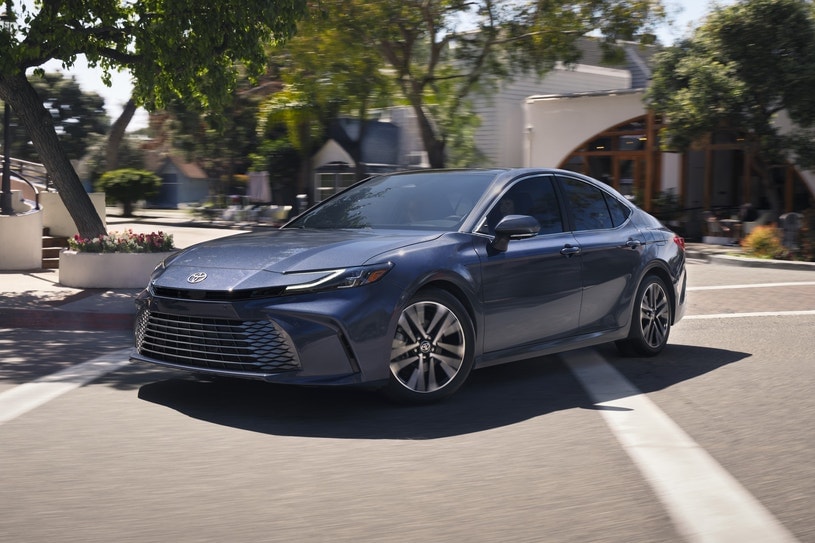 View 6 more photos
View 6 more photos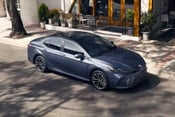 View 6 more photos
View 6 more photos View 6 more photos
View 6 more photos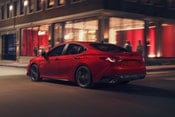 View 6 more photos
View 6 more photos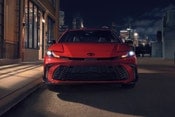 View 6 more photos
View 6 more photos2026 Toyota Camry Review
Pros
- High fuel economy
- Quiet and roomy interior
- Easy to drive and operate
Cons
- Engine sounds coarse during hard acceleration
- Front seat comfort is lacking
What's new
- New midlevel Nightshade Edition trim
- Part of the ninth Camry generation introduced for 2025
Overview
What's not to like about Toyota's 2026 Camry? This midsize sedan looks good, drives well, comes standard with loads of modern tech and driver assist features, and is available in front- and all-wheel drive. It's also all-hybrid, which means you can get great fuel economy in a family-friendly four-door that's much more spacious than the similarly priced Prius. We wish the front seats were a bit more comfy, and that the engine sounded nicer, but that's a pretty short gripe list against a long, long list of positives.
Edmunds spotlight: Same efficient powertrain, one new trim
The Camry's fundamentals remain unchanged for 2026. Every Camry is powered by a four-cylinder engine augmented with hybrid componentry. In years past, hybrid vehicles were typically pretty slow, but no more. The Camry's hybrid powertrain makes 225 horsepower with front-wheel drive or 232 hp with all-wheel drive. That's certainly enough for everyday driving and no-fuss passes on the highway. Plus, the most efficient Camry earned a 51 mpg combined rating last year from the EPA. The only meaningful change for 2026 is the addition of a new trim level called the Nightshade Edition. Camry Nightshade versions get black exterior trim for the grille, door handles, mirrors and rear spoiler. They also come with black 19-inch wheels and the sport-tuned suspension shared with SE and XSE trims.
Competitors to consider
Sedans might be getting outsold by SUVs, but there are a few good ones to choose from. The Camry consistently ranks high in our ratings, but we also recommend the Honda Accord, Kia K5 and Hyundai Sonata. The Accord and Sonata are also available as hybrids. You might also consider the Honda Civic or Toyota Corolla if you're looking to spend less money. The Civic, in particular, is nearly as big as the Camry and is now available as a hybrid. Check out our Expert Rating for all the details on the Camry.
Edmunds Expert Rating
Performance
We are also impressed with the Camry's responsive steering and stable handling. Granted, we tested an XSE, which has a sport-tuned suspension, but overall you can expect the Camry to be secure when driving around corners.
Comfort
Toyota dialed in the ride comfort just right on this new Camry. It doesn't feel floaty or disconnected from the road, but it soaks up bumps and dips without issue. The Camry stays nice and quiet in the cabin, even at highway speeds. The only major noise intrusion comes from the engine, which is gritty and unpleasant to listen to when you mash the gas.
Interior
Compared to some other midsize sedans, the Camry's driving position is pretty upright — almost too much so. It gives a more high-riding feeling, with a great view over the hood and directly behind. Passenger space is solid in both rows, and the car's flat roofline means that headroom is good for everyone.
Technology
The real impressive stuff is with the driver aids. The Camry features the latest in Toyota safety tech and it is near flawless. The system can now sense when cars are coming in and out of lanes and can adjust speed accordingly. With the optional Traffic Jam Assist feature, you can also take your hands off the wheel at speeds of up to 25 mph when conditions allow.
Storage
If you need to install car seats for small children, LATCH anchors are located under clearly marked flaps and are close to the surface with nothing getting in the way. The rear bench is also wide and spacious enough that multiple seats should work fine. Just watch your head on the way in.
Fuel Economy
Value
Wildcard
2026 Toyota Camry trim level differences
For 2026, the Toyota Camry sedan is available in five trim levels: LE, SE, Nightshade Edition, XLE and XSE. All come standard with a hybrid powertrain. Front-wheel-drive Camrys make 225 hp, while all-wheel-drive Camrys get a slight bump to 232 hp.
Which Camry trim does Edmunds recommend?
If you're buying a Camry for value and efficiency, we think the XLE is the sweet spot in the lineup. It comes with the upgraded infotainment system, which offers a 12.3-inch screen but gives up the larger 19-inch wheels in favor of 18-inchers that help preserve ride quality and save fuel.

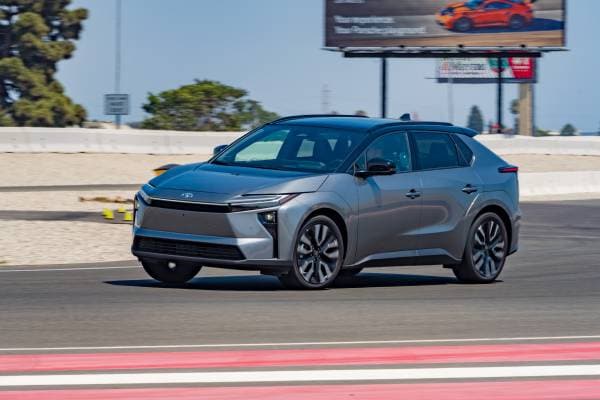
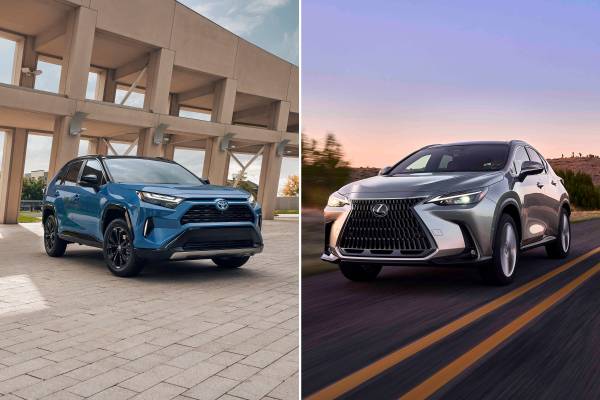
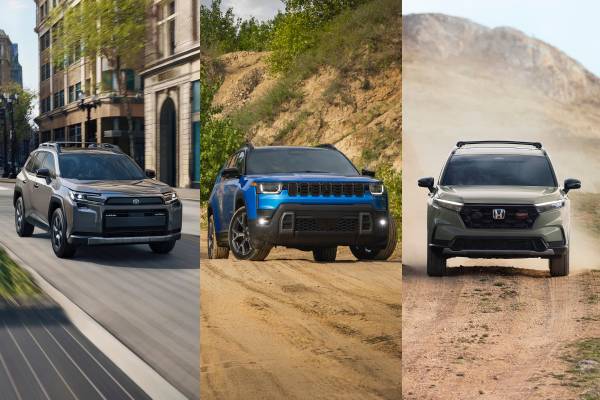
2026 Toyota Camry videos
Future Cars to Get Excited About | The Best New & Upcoming Cars for 2024-2025
NOTE: This video is about the 2025 Toyota Camry, but since the 2026 Toyota Camry is part of the same generation, our earlier analysis still applies.
Related 2026 Toyota Camry info
Similar Vehicles
Research more upcoming vehicles
- 2026 Ford Transit Passenger Van News
- 2026 Acura RDX News
- 2026 Mercedes-Benz G-Class News
- 2026 Toyota RAV4 Plug-In Hybrid News
- 2026 Mercedes-Benz Sprinter News
Popular new car reviews and ratings
- 2025 Subaru Outback
- Tesla Model S 2025
- New Hyundai Kona
- Cadillac Escalade 2025
- New Kia Telluride
- 2026 HR-V
- New Toyota Grand Highlander
- 2025 GLE-Class
- 2025 Porsche 911
- Mazda MX-5 Miata 2025
Vehicle rankings by type
- Electric Car Awd
- Coupe Luxury
- Best Muscle Rankings
- Best Economy Vehicle Rankings
- Best Large Luxury Sedan
- Best Sports Car Rankings
- Best Luxury Compact Sedan
- Best Exotic Vehicle Rankings
Other Toyota models to consider
- Toyota Grand Highlander Hybrid 2024
- 2024 Toyota Corolla Hybrid
- New Toyota Previa
- New Toyota Crown
- 2025 Tundra
- New Toyota 4Runner
- Toyota Pickup 2025
- Scion iM 2024
- Toyota Pickup 2024
Research other Sedans
Other models
- Used Infiniti M45 in Matthews, NC 2010
- Used Maserati Grecale in New York, NY 2025
- Used Audi A4-Allroad in Red Bank, NJ 2025
- New Kia Seltos for Sale in Amherst, MA
- Used Lexus GX in Huntington, NY 2025
- Used Mazda MX-30 in Haddonfield, NJ 2023
- Used Rivian R1S in Bellflower, CA 2025
- Used Honda Element in Dickinson, ND 2011
- New Cadillac Escalade-Esv for Sale in Norfolk, NE
- Used Pontiac Sunfire in South Richmond Hill, NY 2005
